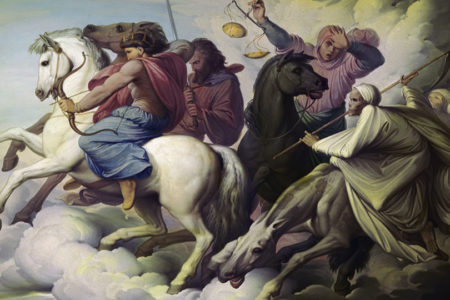Understanding the Olivet Discourse
Jesus’ instruction to His disciples from the Mount of Olives (Mount Olivet, giving it the name the Olivet Discourse) appears in Matthew 24—25; Mark 13; and Luke 17:20–37. It is one of the Bible’s most important texts because it not only provides the Lord’s final discourse but also His most extensive prophetic teaching.
It reveals His interpretation of crucial Old Testament prophetic passages concerning Israel and the nations and serves as an inspired master outline of end-times events. Furthermore, it explains God’s judgment on Israel, especially His promised restoration of it at the advent of King Messiah and the establishment of His Messianic rule.
If properly interpreted, the Olivet Discourse enables the church in this age to distinguish itself from national Israel in the Tribulation—the future “time of Jacob’s trouble”—and from the events that will characterize that time immediately preceding Christ’s return to Earth.
Much prophetic confusion has resulted from a failure to understand that the Olivet Discourse involves Israel, not the church, and refers to a future (eschatological) age, not the past or present one.
Matthew 24:1–14 explains the historical setting (vv. 1–3) that precipitated the prophetic discourse and describes the signs, or “birth pains” (divine judgments of the first half of the Tribulation, vv. 4–13), and the global evangelization that will be accomplished by the midpoint of this period (v. 14).
The setting was the latest occasion of Jesus and His disciples to journey to Jerusalem to worship in the Temple. Aware of Jesus’ pronouncement against the nation and particularly the Temple establishment (He had just said, “’See! Your house [Temple] is left to you desolate,’” Mt. 23:37–38), the disciples perhaps thought a reminder of the national unity symbolized by the Temple might temper Jesus’ disposition toward national judgment. Indeed, some Jewish sects, such as that at Qumran, expected the Temple to be destroyed because it had an illegitimate priesthood and had been ritually defiled; but the disciples knew Jesus continued to reverence the Temple as His “Father’s house” (Jn. 2:16).1
Too, the disciples were impressed, as were most in that day, with the Temple’s unrivaled magnificence, which had become a source of national pride: “Some spoke of the temple, how it was adorned with beautiful stones and donations” (Lk. 21: 5–6). The disciples made their national statement to Jesus as He left the Temple precincts. There, waiting for Him, they began pointing out the latest structural additions to the compound, which, according to John 2:20, had been in process for 46 years: “‘Teacher, see what manner of stones and what buildings are here!’” (Mk. 13:1).
Perhaps the disciples also thought, as did Aristeas in his letter to Philocrates (Letter of Aristeas, 100–101 B.C.), that the Temple was inviolable and invincible. Consequently, they were trying to comprehend Jesus’ judicial remarks. In any case, Jesus addressed both of these ideas in His unexpected reply that all of the stones they had shown Him would be violently torn down at the time of judgment.
No doubt, as the disciples thought on these words, they concluded that Jesus meant the final attack on Jerusalem that Zechariah predicted will come at the end of the age when the Lord will destroy the Gentile nations and establish Messianic rule (Zech. 14:3–9). The disciples believed these events were already in motion and would soon cli-max with Jesus’ public revelation and reign as Messiah.
However, as they walked with Him up the Mount of Olives, the inner circle of disciples determined they needed clarification, especially concerning the issue of the Temple’s destruction and Jesus’ timetable for these events. Therefore, in verse 3, these disciples privately posed two questions: “‘Tell us, when will these things be? And what will be the sign of Your coming, and of the end of the age?’”
The first question concerned the specific time of the Temple’s destruction; the second (composed of two related parts) concerned “the sign” that would mark Jesus’ advent to Israel (Greek, parousia, “bodily presence”) as Messiah at the end of the age.2 Jesus’ response to these questions form the prophetic teaching of the Olivet Discourse. The first question is addressed in Luke 21:10–24 and the second, in Matthew 24:4–31 and Mark 13:1–27.
There has been considerable discussion as to whether the Olivet Discourse was fulfilled in the past or is yet to be fulfilled, as futurists believe. Historicists have held that most of the events described (except Christ’s advent) have been fulfilled. Preterists contend all events (including the advent) were specifically fulfilled in A.D. 70. The disciples had also presumed a connection between the Temple’s destruction and the Messianic advent. Jesus gave the Olivet Discourse to correct this misunderstanding and protect the disciples from becoming deceived as a result of the events that would take place in their generation, since Jesus would not bodily return to restore Israel and establish the Messianic Kingdom after Rome razed the Temple.3
Therefore, Jesus began His discourse with a warning: “’Take heed that no one deceives you’” (v. 4). Failing to understand this warning, preterists have been led astray in their interpretation, being forced to spiritualize prophecy in an attempt to force a first-century fulfillment. However, what the disciples saw as connected events, Jesus explained were chronological and sequential but would not all occur within the same time frame.
Despite the terrible conditions of the Tribulation, one of the greatest evangelistic outreaches in history is predicted: “‘And this gospel of the kingdom will be preached in all the world as a witness to all the nations, and then the end will come’” (Mt. 24:14).
This global message, while having the same elements as the gospel of grace, that is, faith in Jesus as Savior, focuses on repentance concerning Messiah’s coming to overthrow the nations and establish the Messianic Kingdom for Israel. It is this repentance that will reverse the condition of Israel’s house being left desolate (Mt. 23:38–39; cf. Acts 3:19–21).
This was the same message initially preached by John the baptizer and by Jesus during His earthly ministry. However, “the gospel of the kingdom” cannot again be proclaimed until the nation has moved into the chronological confines of Daniel’s 70th week. The Greek term for “world” in verse 14, while meaning “the inhabited earth,” cannot be limited to a particular region but must include the entire world of Gentile occupation.
It is this “world” that Christ is coming to judge (Acts 17:31), which is implied by the phrase then the end will come. For this reason this global evangel cannot be limited to the first-century Roman Empire. Nor could it have been accomplished within 25 to 30 years of Christ’s ascension. Nor did it fulfill the Great Commission by A.D. 70, as preterists contend.
The good news that the Lord Jesus has left for believers in this future time of Jacob’s trouble is that “birth pangs” will not hinder the gospel of the Kingdom. Instead, the judgments will magnify its message, enforce its urgency, and fulfill the promise of Jeremiah’s prophecy that Israel “shall be saved out of it” (Jer. 30:7).
ENDNOTES
- For further discussion see Randall Price, The Coming Last Days Temple (Eugene, OR: Harvest House, 1999).
- Gerald B. Stanton, Kept From the Hour (Grand Rapids: Zondervan, 1956), 21.
- Randolph O. Yeager, “Matthew 19—28” in The Renaissance New Testament (Gretna, LA: Pelican Publishing Company, 1998), 277.








How then do we reconcile the writings of Josephus, Yosippon, Hegesippus, and Tacitus? They clearly describe chariots with soldiers on horses and fire in the clouds. That seems like the writing of Christs return. Was that only for Jerusalem and we will see a different coming of Christ?
The end time message is already underway. Where and how this message would be composed and distributed, and by whom, is well attested by the major prophets.
The Gospel of Grace came about because the Gospel of the Kingdom where Jesus Christ was
proclaimed to be the Messiah, was rejected by the Jews. What do you think would have happened
had Israel accepted Christ as the Son of God and Messiah at the time He presented Himself to them?
(which is what will happen during the 70th week of Daniel) It would have ushered in the Kingdom
age then and there. Until Christ was crucified, died and resurrected, there could be no age of grace.
For it is by Grace you have been saved and that not of yourself lest any man boast. The Kingdom
of the 1000 year rule of Christ on Earth is when the Jewish concept of the Kingdom age comes to
fruition.
When I study Matthew 24 and 25 the church is not mentioned at all. It’s because is about the Nation of Israel, when the Gospel of the Kingdom is talked about, it the same Gospel of our salvation, 1corinthians 15:1-4…
However it’s the time of Jacob‘s trouble, 7 years of tribulations, the Gospel of the Kingdom is the gospel to the Nation of Israel will be preached at the end times, because Israel will be saved … Jeremiah….the Kingdom the 1000 year reign when Jesus will be on earth. Just at the end of Matthew 23, Jesus is saying o Israel how I wanted to gather you like a mother hen gathers her chicks, BUT YOU ( ISRAEL) were un willing ( 1st. Advent) . Reader pay attention….I wold recommend a pastor Andy Woods. On this subject you can YouTube.
I am a missionary pastor who is presently preaching through the Olivet Discourse and found this article as part of my research. Per the website, I can understand the Jewish perspective. However, distinguishing the “Gospel of the Kingdom” from the “Gospel of Grace” is only conjecture. Nowhere in the scriptures is there evidence of any division here. Going to all the world to preach the Gospel, commanded by Christ to the disciples and by extension to all believers, is what is “hastening the coming of Christ”. Once this takes place, then the end will come. There is only ONE Gospel and it is the Power of God for Salvation to everyone who believes.
Well said! I’m in total agreement.
There is only one Gospel. I love how Paul tells us what exactly is the Gospel of our salvation. 1 Corinthians 15:1-4. Ephesians 1:13-14..
Verses Acts 3:19 repent ( change of mind, from unbelief to believe on the lord Jesus) and be converted, that your sins may be blotted out, so that the times of refreshing may come from the presence of the Lord. This is my understanding of repent, some how the word repent got changed from the original Greek to mean do a one eighty, feel sorry or confess your sins. Everything in context. Like in Luke Jesus told the Pharisees repent or you likewise will perish…
I agree with you, brother. Too much of these would result in total confusion.
Nov 3rd for some reason two words popped into my head and just kept repeating Olivette Discourse … I am a Christian however I do not read the Bible as much as I should. I believe the Ezekiel 36 -38 prophecy will soon come to pass. This was clear as day … the only other time this has happened was the words Balfour Agreement cam into my mind. Be Blessed all
This was an interesting introduction to the Olivet Discourse. It helped me understand what and why these passages were so important. I will continue to study these areas.
Hi Randall,
This book is a good read :
https://www.academia.edu/8664727/END_TIMES_AND_ISRAEL
Regards
Thank you for that message love to learn new things.
God Bless